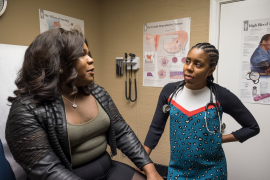As many as 1 million people are estimated to have enrolled in health insurance coverage through the Affordable Care Act’s (ACA) marketplaces since the Biden administration reopened them in February. The enactment of the American Rescue Plan (ARP) means many of these new enrollees, and the 12 million people who were already enrolled, are paying dramatically lower premiums. Many enrollees have had their premiums reduced to zero because of the law’s temporary premium subsidies.
Americans have consistently reported that cost deterred them from buying, and in some cases even shopping, on the ACA marketplaces. The ARP’s new subsidies, the most significant improvement in the affordability of insurance since the ACA became law in 2010, are benefitting new enrollees and giving millions of already-insured families much-needed financial relief.
But with nearly 30 million people still uninsured and some 40 million with plans that leave them potentially underinsured, out-of-pocket health care costs continue to put millions of families in financial peril. President Biden’s American Families Plan aims to improve the economic security of U.S. families. Affordable health insurance and health care are critical to achieving that greater economic security.
There are three policy changes linked to the ACA marketplaces that would build on the success of the ARP subsidies to cover more people and provide permanent financial relief to families across the age and income spectrum.
First, as the American Families Plan proposes, making the temporary ARP marketplace subsidies permanent would reduce the number of uninsured by 4.2 million in 2022 according to the Urban Institute. In addition, the policy would reduce household health care costs for people enrolled in the marketplaces and the individual market by nearly one-quarter. A 64-year-old earning about $51,200 a year would experience a premium cut of more than $8,000 a year.
Reining in deductibles and out-of-pocket costs in marketplace plans would even further reduce family spending on health care. About two of five adults enrolled in the individual market and marketplaces were potentially underinsured in 2020 because these costs were so high relative to their incomes. A bill introduced by Senator Jeanne Shaheen (D–N.H.) includes a model for how to do this. It would raise the cost-protection of the marketplace benchmark plan and make more people eligible for cost-sharing subsidies. This could eliminate deductibles for some enrollees and reduce it for others by as much as $1,650.
Second, opening the ACA marketplaces to uninsured people in the 14 states that have not yet expanded Medicaid would provide an estimated 2 million uninsured people with an immediate coverage option. While the ARP provided more federal dollars to these states as an incentive to expand, the politics around expansion in states like Texas and Florida make it likely that these uninsured people, among the poorest in the country and disproportionately people of color, will remain uninsured for years to come. Allowing eligible people in these states to enroll in a public plan or Medicaid-like plan offered through the marketplaces at $0 premium and $0 deductible would help provide economic security.
Last, marketplace affordability improvements could help millions of families with high premiums and out-of-pocket costs in employer plans. Under current law, people with employer coverage premiums that exceed 9.8 percent of their income are eligible for subsidies through the marketplaces. Lowering the affordability threshold for employer plans to 8.5 percent of income for both single and family policies would mean that no one would have to spend more than that on their health insurance. Moreover, it would equalize affordability across the individual and employer insurance markets. The current threshold for unaffordable cost-sharing in employer plans could also be raised.
The Biden administration and Congress have moved assertively to provide economic relief to families struggling to rebuild their lives in the waning months of a devastating pandemic and to create a long-lasting level of security for low- and middle-income families. But without affordable health care, no family can be economically secure.




